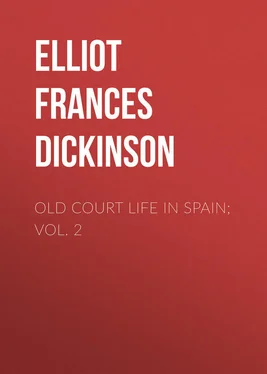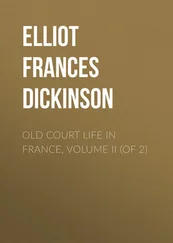Frances Elliot - Old Court Life in Spain; vol. 2
Здесь есть возможность читать онлайн «Frances Elliot - Old Court Life in Spain; vol. 2» — ознакомительный отрывок электронной книги совершенно бесплатно, а после прочтения отрывка купить полную версию. В некоторых случаях можно слушать аудио, скачать через торрент в формате fb2 и присутствует краткое содержание. Жанр: foreign_antique, foreign_prose, на английском языке. Описание произведения, (предисловие) а так же отзывы посетителей доступны на портале библиотеки ЛибКат.
- Название:Old Court Life in Spain; vol. 2
- Автор:
- Жанр:
- Год:неизвестен
- ISBN:нет данных
- Рейтинг книги:3 / 5. Голосов: 1
-
Избранное:Добавить в избранное
- Отзывы:
-
Ваша оценка:
- 60
- 1
- 2
- 3
- 4
- 5
Old Court Life in Spain; vol. 2: краткое содержание, описание и аннотация
Предлагаем к чтению аннотацию, описание, краткое содержание или предисловие (зависит от того, что написал сам автор книги «Old Court Life in Spain; vol. 2»). Если вы не нашли необходимую информацию о книге — напишите в комментариях, мы постараемся отыскать её.
Old Court Life in Spain; vol. 2 — читать онлайн ознакомительный отрывок
Ниже представлен текст книги, разбитый по страницам. Система сохранения места последней прочитанной страницы, позволяет с удобством читать онлайн бесплатно книгу «Old Court Life in Spain; vol. 2», без необходимости каждый раз заново искать на чём Вы остановились. Поставьте закладку, и сможете в любой момент перейти на страницу, на которой закончили чтение.
Интервал:
Закладка:
Before the cathedral, public tables are spread with highly flavoured viands such as Spaniards love, to be washed down by strong Xeres wine served out of great earthen jars, so big it seems as if thousands could be satisfied.
Don Pedro would have ridden alone into the city, but for the remonstrances of Albuquerque and of his mother, who, with tears implored him not to rouse the suspicions of his subjects by such a disregard of royal custom as to allow his bride to return alone.
Thus while all the citizens wait beside the tables (none caring to fall to until the king’s return) a flourish of clarions and trumpets suddenly announces his presence, preceded by a troop of men-at-arms in the low cap and close-setting jerkin of that warlike time. Don Pedro himself mounted on a coal-black war-horse, the jewelled reins held by two great nobles, the Lord of Bertrayo and the Sevillian Don Enrique de la Cerda, husband of Doña Maria de Coronel.
Beside him, but somewhat in the rear, rides the queen, her bridal veil enveloping her like a shroud, and it is well so, for her ashen cheeks and sunken eyes would tell a tale of suffering no words could express.
Following after her comes the queen-mother, mounted on a white mule shod with gold, her eyes cast down, and with a visage full of sorrow.
As the young queen passes, the word goes round that she is an unwilling bride. “And no wonder, poor soul,” answers a richer burgher, who has pushed himself forward and looks into her white face, “if she knows the sort of husband she is espousing. He kills all who come to him.”
“An ill-omened couple,” whispers a fat countrywoman into his ear. “Look at the king, he never turns his eyes on the poor young thing, but rides straight on, and so fast her horse cannot keep pace with him. Why does he marry her? It is plain to see he hates her. I wonder how the young queen will like his harem ? They say he lives like a Moor, and keeps a whole bevy of slaves shut up in the castle of Carmona.”
“Poor soul, I would not be in her shoes, and have to face his mistress, Maria de Padilla,” says another woman; “and after all, why should the king flout her if he likes a pretty face?”
“Belike some one has cast a spell on him,” observes a little man in a black capa and mantle, the city medico .
“Aye,” is the reply, “a jealous woman has overlooked her.”
And so it came to be understood among the crowd that the king had been bewitched and never would care for his girl queen.
“God grant he may not murder her,” are the last words of the fat countrywoman as they all move on to where the tables are spread.
The king meanwhile is hurrying in the most unseemly fashion, indifferent to the discomfort he causes to those behind, especially to the Lady Blanche, who with her two royal rein-holders, the Grand Master Don Fadique and the Infante of Aragon, not daring to look up, is now separated from him, which greatly mars the effect of the pageant.
The knights, having changed their armour while Queen Blanche was in her retiring room, reappear in fanciful suits of many-coloured silk and brocade, their helmets replaced by graceful caps, ornamented with gems and pearls, in readiness for the nuptial banquet.
Don Juan de Mañara is most conspicuously attired in the excess of the mode, of no great beauty, but with so bold an eye, it is said of him he fears neither the living nor the dead. In all his wildest excesses Don Juan is the king’s companion, but never for murder, injustice, or spoil. No wantonness is too great for him where women are concerned, and woe to the wife or maid who takes his fancy.
No one can rival Don Juan in the jewels he wears except the southern lord, Ponce de Leon, whose robe of pale silver tissue is covered with uncut stones, and his head encircled by a wreath of orient pearls taken from a Moorish emir whom he has slain.
Don Enrique de la Cerda, the king’s favourite before Don Juan, but so much better than he that the people of Seville call him jeeringly El Santo , is attired in a dark velvet suit quite at variance with his usual magnificence. It is rumoured that he is out of favour on account of his beautiful wife, Doña Maria de Coronel, upon whom the king has cast eyes of love, a distinction which, contrary to fealty and allegiance as understood in those times, Cerda has not appreciated, and has not only shut her up in his castle of Cerda, but is inclined to listen to the overtures of Enrique of Trastamare and forsake the king altogether.
The board blazes with flowers, Moresque porcelain, and glittering plate; precious candelabras of sculptured silver shed a soft light, and jewelled vases and golden cups give it back in intensest colours, as the king and queen enter to the sound of trumpets and take their place in the centre, beside them the royal princes and the Infante of Aragon, the ministers of state, and such ambassadors and envoys as have been invited to the tournament.
Wonderful to relate, Blanche is wreathed in smiles. This is Claire’s doing. She has contrived to convey to her a message from the Grand Master, promising an interview for the morrow, when the king rides to Segovia. As the brother of the king, Don Fadique sits at her side. For an instant their hands meet, and such a thrill of pleasure shoots through her little heart as gives her courage to face every mishap. Child as she is, she clings to happiness. The future is an unveiled mystery. Why despair?
From Don Fadique her eyes wander to Don Pedro, placed on her other side. He has the same smooth face as his brother, but sterner and loftier, and a majesty of expression all his own. He is not frowning now, and the change is marvellous. No one could compare the two brothers.
“Who knows,” Blanche begins to ask herself, peeping at him from under her long eyelashes, “if he really is such a monster as report gives out? Can anything be more perfect? His long wavy hair hanging in heavy curls.” At this moment he is leaning over her in conversation with Don Fadique. No shade of displeasure is on his face, as he casts on her such a glance as brings blushes to her cheek. Alas! alas! could she but read the treachery of his heart as he plays with the lace tissue of her robe, and lowers his voice to a soft whisper as he addresses her, she would flee from the hall, the city, and the land.
Little did the light-hearted daughter of Navarre understand the passions, deep down and fierce, of the Spaniards. Not voluble and capricious like the French, but sullen, silent, sinister, hiding all emotion under a mask. This she did not understand, nor that she had mortally offended Don Pedro, who but dissembled his revenge, storing up each word and look she thoughtlessly addressed to Don Fadique.
Poor Blanche! – her bright little head, encircled with the regal diadem – let her enjoy her brief moment of triumph. Little by little her heart is yielding to the fascinations of Don Pedro, the most brilliant cavalier she could have conjured up even in her dreams, and she feels that if he would but take her to his arms, she would tell him all her tale; how every one has frightened her, and that now she is ready to love him for ever and aye. It is all right now, and she feels so happy, she talks incessantly to Don Fadique in the pauses, telling him all she feels, which makes him inexpressibly wretched, and he casts on her the most longing glances, as a precious treasure he has lost, and heaves great sighs as he raises his eyes to her laughing face – at which she is really grieved, trying by all possible means to console him.
Don Pedro looks on with a strange, fixed smile. Now and then he even joins in the conversation with a loud harsh laugh, which, to say the truth, frightens Blanche, but, delighted at the change in his bearing towards herself, she interprets it all as “men’s ways,” and hopes in time to grow accustomed to him. Every one could not be so gentle as the Grand Master, who, after all, was half a priest, so Claire said; and of the two, ignorant Blanche said in her heart, how much more she admired the rough blunt ways of the king.
Читать дальшеИнтервал:
Закладка:
Похожие книги на «Old Court Life in Spain; vol. 2»
Представляем Вашему вниманию похожие книги на «Old Court Life in Spain; vol. 2» списком для выбора. Мы отобрали схожую по названию и смыслу литературу в надежде предоставить читателям больше вариантов отыскать новые, интересные, ещё непрочитанные произведения.
Обсуждение, отзывы о книге «Old Court Life in Spain; vol. 2» и просто собственные мнения читателей. Оставьте ваши комментарии, напишите, что Вы думаете о произведении, его смысле или главных героях. Укажите что конкретно понравилось, а что нет, и почему Вы так считаете.












